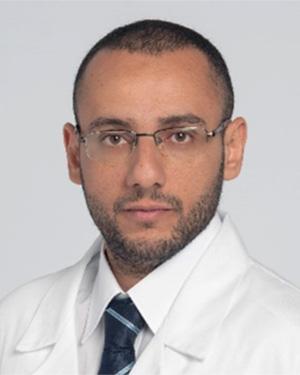Research News
06/13/2025
Cleveland Clinic researchers successfully engineer bacteria to target kynurenine in cancer tumors
The study addresses a long-standing hurdle to using genetically engineered bacteria in cancer treatment: precision.

A new Cleveland Clinic study shows genetically engineered bacteria designed to target the metabolite kynurenine successfully reach and attack tumors in preclinical models without infecting other areas of the body.
The research, published in Science Advances and led by the lab of Mohammed Dwidar, PhD, addresses risk of infection as a long-standing barrier for harnessing bacteria as a form of cancer treatment.
How can bacteria be used as a cancer treatment?
A bacterium attacks cancer cells in the same way it would harm any other cell during an infection. Bacterial infection also attracts immune cells that will fight the tumor in addition to the pathogen. Dr. Dwidar’s lab has been experimenting with ways to ensure bacteria introduced to fight cancer goes straight to tumors and avoids infecting other areas of the body.
Ovarian and breast cancer tumors contain high levels of kynurenine, an immunosuppressive metabolite. In the lab, the research team genetically engineered a Salmonella enterica strain to become “addicted” to the metabolite, using it as a source of energy.
“In our preclinical studies, a week after injecting our engineered bacteria, we saw that virtually all of the bacteria remained within the tumor,” Dr. Dwidar shares. “This was remarkable and showed us the extent to which the bacteria really did avoid other areas of the body. We also found that its tumor reduction capabilities were not weakened.”
Research and development included collaboration with other Cleveland Clinic experts, including the labs of Ofer Reizes, PhD, Justin Lathia, PhD and Stanley Hazen, MD, PhD. The unique specifications of the engineered bacteria are now under patent. The lab is working with Cleveland Clinic Innovations to continue to fine-tune the bacteria for specificity and efficacy, preparing the treatment for potential clinical trials.
Dr. Dwidar says the treatment has potential for other cancers because kynurenine is found in all cancer tumors. The bacteria should travel to wherever cancer is found, even if it has metastasized, he says. Dr. Dwidar is hopeful that genetically engineered bacteria could become a viable adjunct or alternative to chemotherapy or radiation treatments in the future because of its precision.
“Immunotherapies are the future of cancer treatment. With the engineered bacteria my lab developed, it has high specificity to go straight to the tumor, and there’s a possibility we could load it with additional medication to be even more potent to the tumor,” Dr. Dwidar says. “It’s ideal for cancer patients to have more treatment options available to them, and that’s what I strive for every day with my work.”
Featured Experts
News Category
Related News
Research areas
Want To Support Ground-Breaking Research at Cleveland Clinic?
Discover how you can help Cleveland Clinic save lives and continue to lead the transformation of healthcare.
Give to Cleveland Clinic